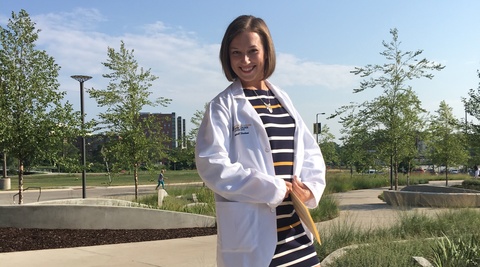
Degree: MD
Matched: Psychiatry, University of Missouri - Kansas City
How did you choose this career path?
I grew up in a family of nurses, so I was always interested in the health care profession. In college I explored a lot of different paths—physical therapy, physician’s assistant, nurse practitioner—and ultimately decided that the physician role was what I was most interested in. As far as choosing Iowa, it helped that this is my home state! I had a warm welcome when I interviewed, and I felt like I would be supported in accomplishing my goals here.
What experiences outside the curriculum greatly enhanced your education?
I was involved in the Free Mental Health Clinic, which offers care for patients who are on waitlists to see psychiatrists or maybe don’t currently have insurance. I got involved in my M1 year. I loved that I could get early interaction with patients and learn skills like patient interviewing, presenting our patients to a physician, and getting hands-on mentoring with the residents and physicians who helped staff the clinic. At that time, I didn’t know that I would be going into psychiatry, but it definitely helped shape my desire to go into that specialty. I eventually joined the executive board, and I’ve really appreciated helping make decisions that impact the clinic for the better.
Who was especially helpful in guiding and mentoring you?
I have a long list of people who have been so helpful. I was between three specialties during my third year, so I felt a little overwhelmed. I ended up utilizing Dr. Haugsdal, my learning community director in Bean. Even though I wasn’t interested in OB-GYN as a specialty, he was very helpful as a neutral third party who encouraged me in the steps toward making this big decision. My mentor within psychiatry, Dr. Morse, has been helpful in the nuances of the decision and how to take next steps toward residency. She’s a great role model for her career and her patient care.
What was the most rewarding part of your Carver College of Medicine experience?
When I got into clinical rotations and began caring for patients, I really started to enjoy myself. One rewarding moment was having a conversation over several days with someone who had attempted suicide. She had no previous encounters with mental health, so she didn’t have the terminology to explain what she was feeling. Listening to her and seeing her reach a point where she was committed to helping herself get better was not only a turning point in realizing I could be successful in psychiatry, but also in feeling like I could make connections with patients.
Share one memory that sticks out from your time as a student in the Carver College of Medicine.
During my M1 year in our immunology class, our professor Dr. Houtman mentioned while we were learning about chicken pox that he had gotten chicken pox right before his fifth birthday, so his birthday party had to be cancelled. I happened to find out that his birthday was coming up soon. We got this giant card wishing him a happy belated fifth birthday, and the entire class signed it. At the end of the course, the class all sang him “Happy Birthday,” and we threw him the fifth birthday party he never had. It’s a testament to my graduating class, how much we care, and our fun-loving spirit.
One other favorite memory is participating in the Carver College's annual comedy and musical theater production called Frolics. It was canceled the last two years, but I'm directing it this year, and we've all been having a blast preparing for it.
What advice would you give to an incoming student?
I have found it really helpful to utilize mentors, whether they’re students that are a year or two ahead of you, or whether it’s administration or faculty members. Sometimes you have to do a little extra work to seek them out, but the university does try to give you opportunities and resources. Also, a lot of what I’ve enjoyed in medical school is what I’ve done outside of medical school, and I think that has translated into being able to get through the rigorous nature of it all.